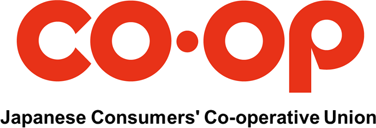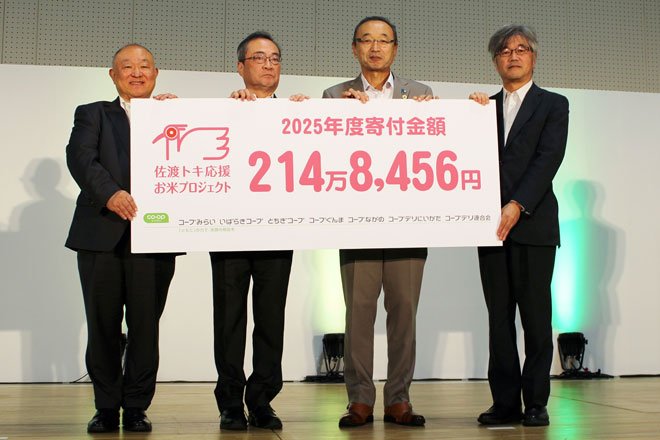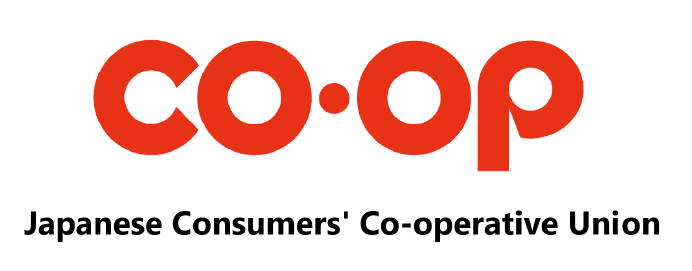2015 JCCU Business Report and Key issues in 2016
2016.07.10
At JCCU’s General Assembly held on June 17, Mr. SHIMADA Hiroyuki, Managing Director/CEO reported that in fiscal 2015 (April 2015-March 2016) consumer co-ops achieved an increase in both sales and surplus. This trend has continued for three consecutive years.
According to the business report, membership of the community-based retail co-ops for the fiscal 2015 was 24.6 million an increase of 1.8% compared with the previous year.
The total business turnover obtained was 2.77 trillion JPY (102.6% year-on-year) and the ordinary surplus rate was 1.86% which is an extension of 0.14 point from the 2014 fiscal year.
The home delivery business sales increased by 2.1% from the previous year to a value of 1.73 trillion JPY given an ordinary surplus ratio of 3.49%. A new home delivery business model with the utilization of IT and improvement of delivery convenience through effective logistics distribution infrastructure was advanced.
In the case of the store business, reform towards overcoming the store deficit was advanced. To improve profit and loss, non-profitable stores were closed while advancing on store renewal and new store openings. In the fiscal 2014, 11 co-op stores became surplus and 34 stores also improved their profit and loss. The estimated retail sales amount for fiscal 2015 is 902.4 billion JPY (year-on-year 103.3%) and the current account surplus rate has improved by 1.22% as a result of strengthening store delicatessen items.
With regards to CO-OP products, JCCU launched a new series of its sub-brand CO-OP Quality products which represent CO-OP products rich in taste. A total of 38 items have been developed and a renewal of 1,184 regular co-op brand items since its launch in 2014.
To raise members loyalty a two-year campaign was started in March 2014 and ended in March 2016 with a total participation of about 2 million Co-op members.
During the fiscal year under review, the total supply of CO-OP products was 3,757 billion yen (budget ratio of 100.7%) and the ordinary surplus 3.67 billion yen (budget ratio of 172.8%).
Key Issues in 2016:
In 2016 fiscal year, in order to achieve the targets set forth in “Co-op Vision 2020”, JCCU has formulated the 13 th three-year plan for the consumer co-ops in Japan which was approved at the 66 th Annual General Assembly.
The plan calls for exertion of collective strength, further strengthening of ties and maintaining sustainable business structure to contribute to the improvement of members’ livelihood.
Special Challenges:
One of the major policies in 2016 will be the advancement of managerial competencies to maintain affordability of CO-OP products.
Also, co-op will continue to promote initiatives to strengthen co-op product competitiveness by expanding member’s participation in product development and improvement.
On retailing business, while we focus on efforts to increase home delivery users we shall also advance efforts for their continuing use of the facility by strengthening the merchandizing of products in the category of frozen foods and convenient foods in response to the changes in the family structure.
We shall also work towards improving the profitability of the store by strengthening the fresh food division.
On Food issues, co-op will further advance effort towards a healthy eating lifestyle through information dissemination and catering services for parents with children and senior citizens.
On social issues, we shall continue to contribute towards improving local communities where any person can live comfortably, especially by putting emphasis on the elderly watch-over program “Regional Protection Agreement” and the moving van sales.
On environmental issues, co-op will further promote initiatives and enlightening activities among co-op members to shift to alternative energy, while reducing environmental load from its operations.
On disaster prevention and mitigation activities, we shall continue to conclude co-operation agreements with the local governments, pledging to provide emergency commodities, transport necessary supplies and support the relocation of disaster victims in the event of natural disaster such as earthquake, typhoons etc.,








